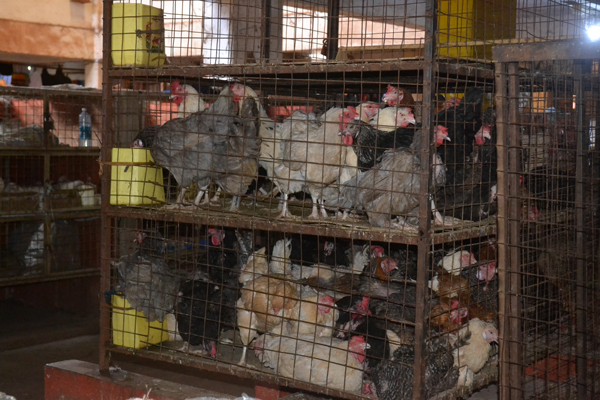Prime
Poultry farmers tipped on practices to prioritise at slaughtering

Chicken being sold in Jinja Central Market. PHOTO/DENIS EDEMA
What you need to know:
- Some of the practices to prioritise at slaughter node include poultry meat inspection, especially post-slaughter inspection to protect the consumers, the slaughterers were urged to only slaughter healthy birds or perform rapid flock health (ante mortem) assessment before slaughtering.
Poultry farmers have been tipped on actionable and implementable behavioural changes at the slaughtering node of the poultry value chain.
This was during a two-day stakeholder dialogue to improve the poultry value chain held at Jinja Nile Resort (Mada Hotels) in Jinja City facilitated by Food and Agriculture Organisation of the United Nations (FAO) and USAID.
The dialogue was moderated by Dr Gerald Nizeyimana from FAO following a study conducted by Makerere University Business School (MUBS) led by Dr Sarah Kyejjusa, a senior lecturer, to characterise the business models of the different private actors along the Poultry value chain in Wakiso and Mukono districts.
The study, which investigated four poultry nodes, including producers, transporters, processors and marketers, discovered that the producers mainly rely on family labour to operate their farms and do not keep proper books of accounts which make it difficult to cost the production and ascertain the actual profits of the business.
The marketers, on the other hand, rely on the walk-ins and a few customers from nearby restaurants. And because their operating costs are low, they make minimal profits and are prone to losses due to the deaths that arise from the storage and congestion of birds in the cages, posing public health risks as poor practices which expose consumers to zoonotic diseases.
The traders of poultry birds were mainly men, who transport the birds using motorcycles. Their costs are low compared to other nodes but they require a lot of working capital to stock the birds. Access to credit within the four nodes was generally informal, with players preferring to borrow from groups, friends and family instead of the formal credit institutions.
For the slaughterers, their process is very rudimentary and highly labor-intensive which causes them to incur high operating costs thus lowering their profit levels. The lack of business management skills and inadequate cash inflows lower the actors’ ability to access finances from the financial institutions.
It was the first meeting with the slaughterers because they interface with the primary producers and it was therefore prudent that if they changed the way they did certain things, the primary producers and consumers will get better profits.
Dr Mubiru, one of the moderators, however, noted that some of the actions taken when chickens die are to bury or incinerate them; but he regretted that some unscrupulous people sell them to the consumer.
Some of the practices to prioritise at slaughter node include poultry meat inspection, especially post-slaughter inspection to protect the consumers, the slaughterers were urged to only slaughter healthy birds or perform rapid flock health (ante mortem) assessment before slaughtering.
Other practices include operating with a food/health handling certificate, setting up designated dumpsites or bins for chicken waste and slaughter in gazetted poultry slaughter premises among others.





